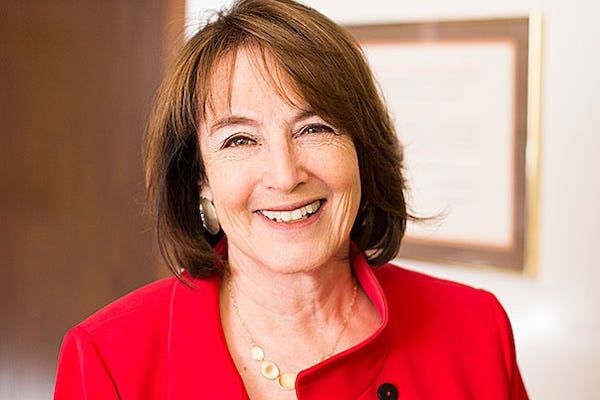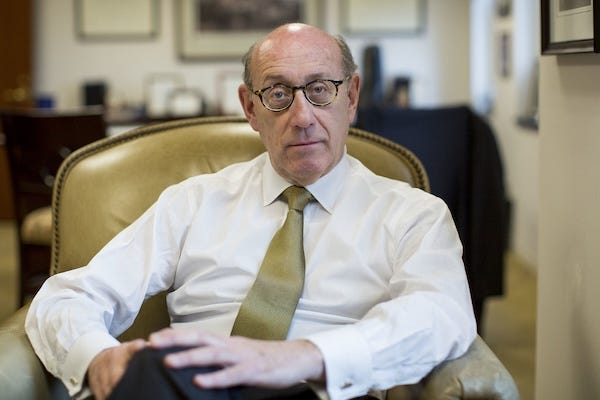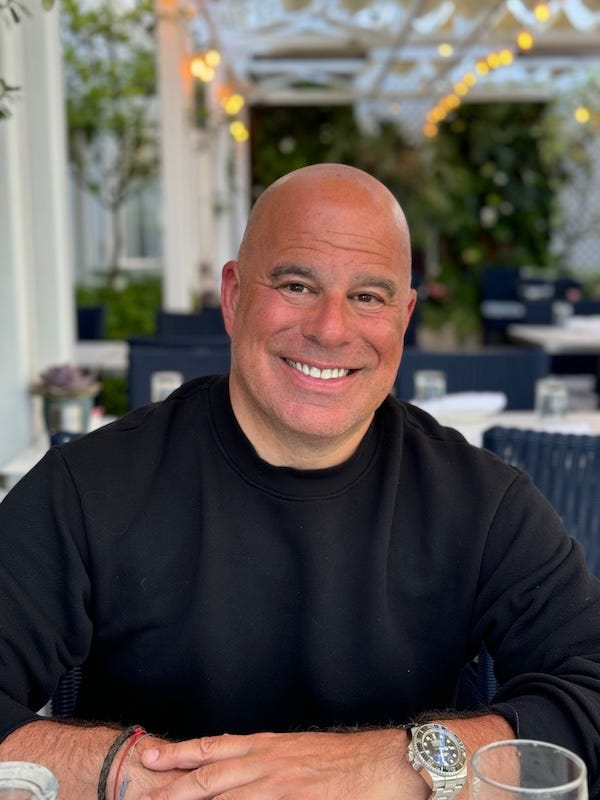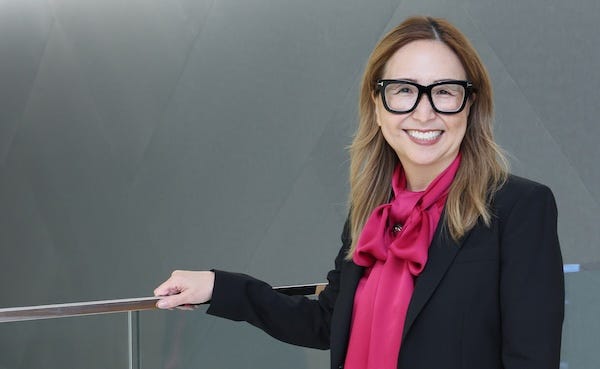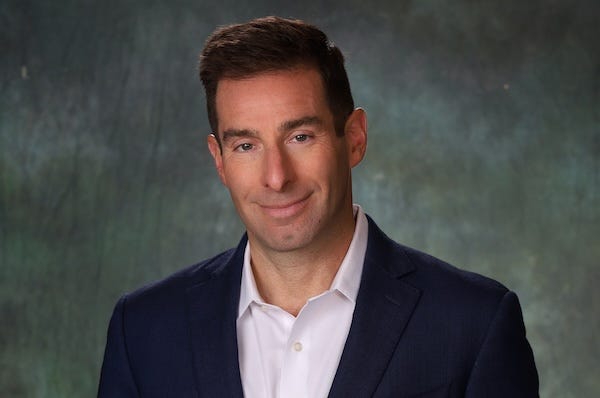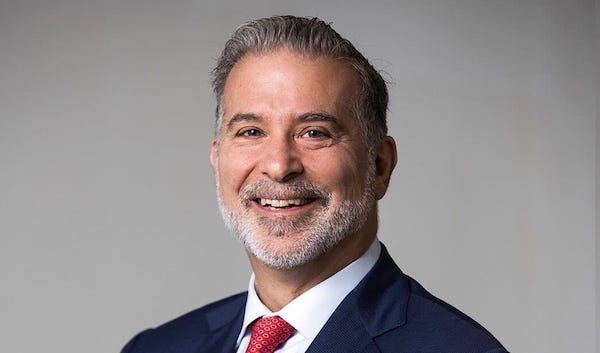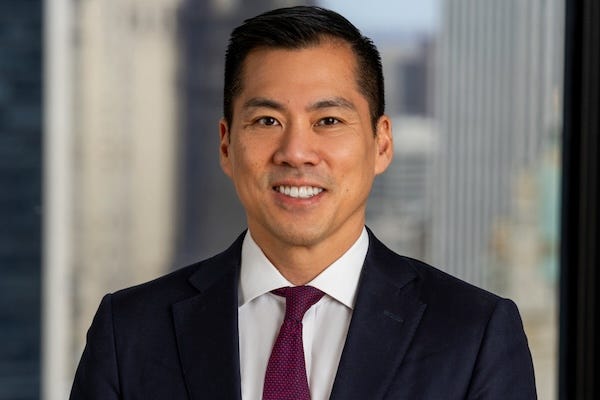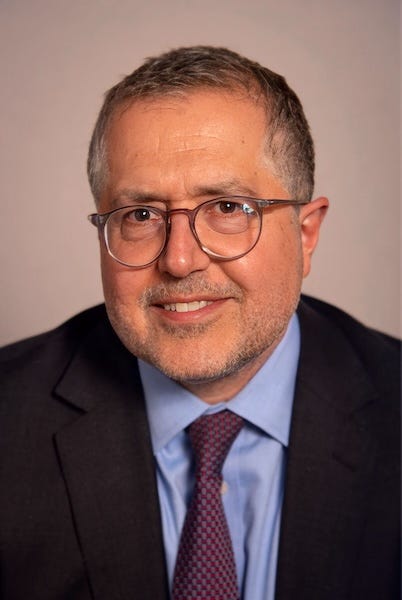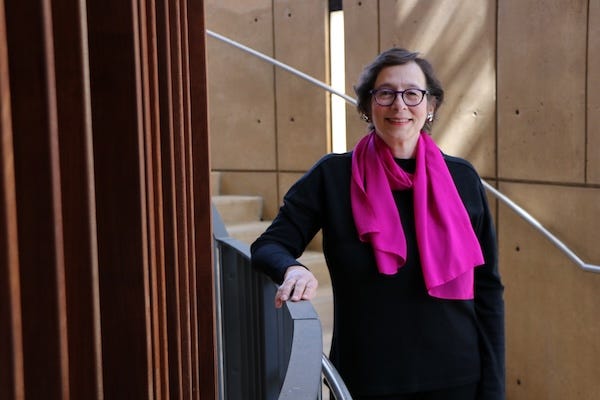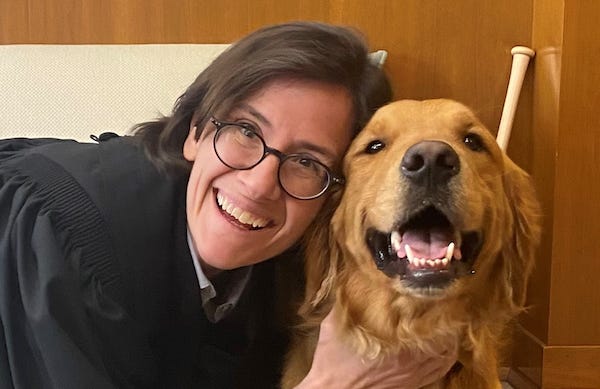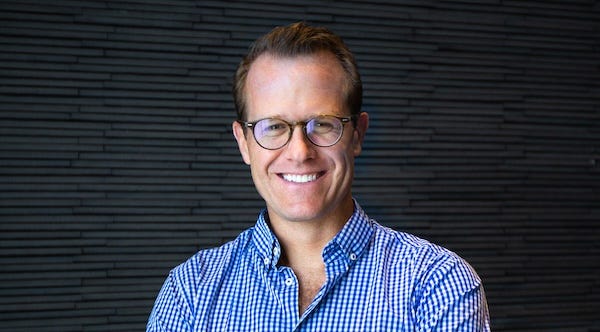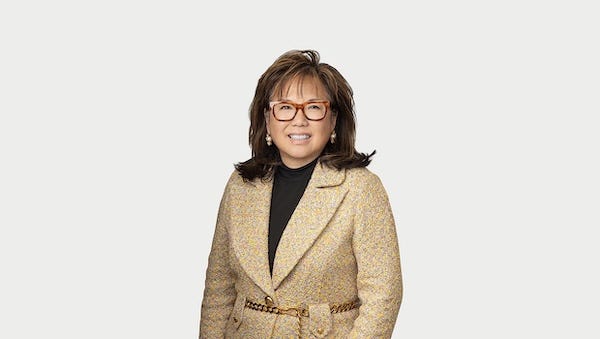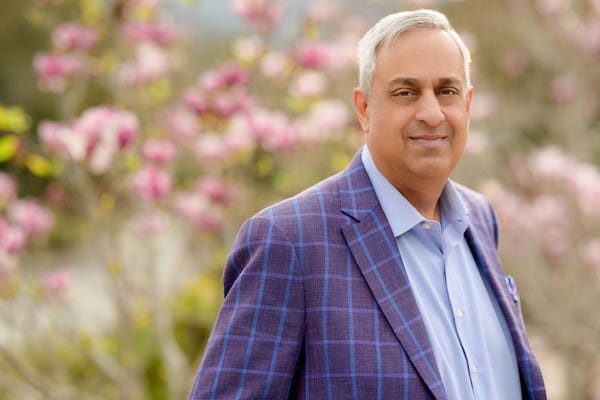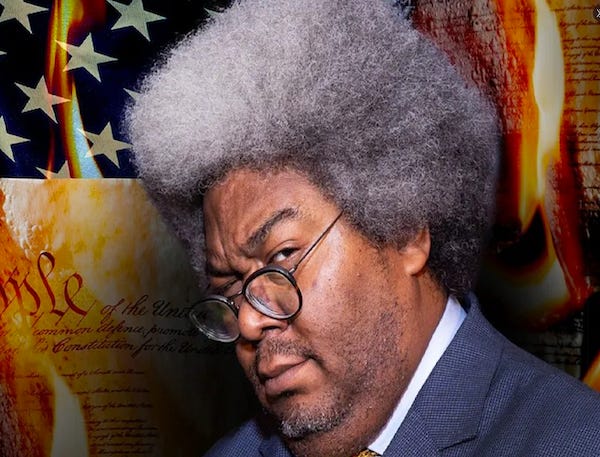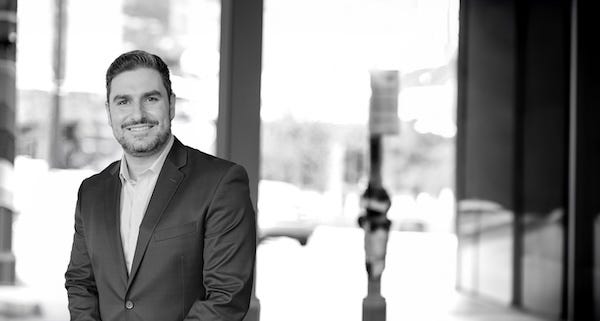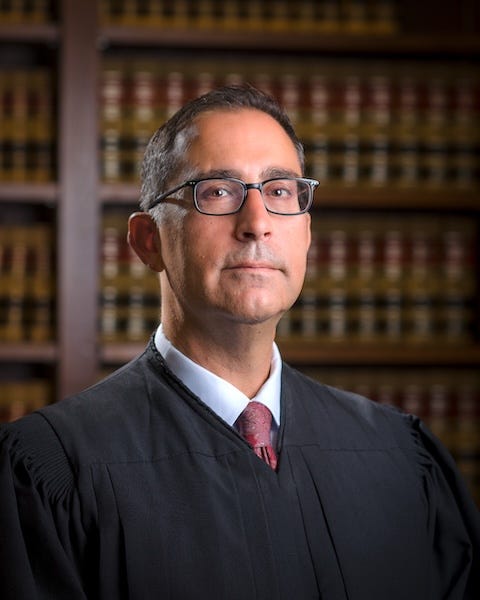Discover Original Jurisdiction
Original Jurisdiction

Original Jurisdiction
Author: David Lat
Subscribed: 65Played: 1,508Subscribe
Share
© David Lat
Description
Original Jurisdiction, a podcast about law and the legal profession, features host David Lat interviewing some of the most interesting, influential, and important people in the world of law. It's the companion podcast to Lat's Substack newsletter of the same name. You can follow David on Twitter (@DavidLat) or email him at davidlat@substack.com, and you can subscribe to his newsletter at davidlat.substack.com.
davidlat.substack.com
davidlat.substack.com
85 Episodes
Reverse
How are the federal courts faring during these tumultuous times? I thought it would be worthwhile to discuss this important subject with a former federal judge: someone who understands the judicial role well but could speak more freely than a sitting judge, liberated from the strictures of the bench.Meet Judge Nancy Gertner (Ret.), who served as a U.S. District Judge for the District of Massachusetts from 1994 until 2011. I knew that Judge Gertner would be a lively and insightful interviewee—based not only on her extensive commentary on recent events, reflected in media interviews and op-eds, but on my personal experience. During law school, I took a year-long course on federal sentencing with her, and she was one of my favorite professors.When I was her student, we disagreed on a lot: I was severely conservative back then, and Judge Gertner was, well, not. But I always appreciated and enjoyed hearing her views—so it was a pleasure hearing them once again, some 25 years later, in what turned out to be an excellent conversation.Show Notes:* Nancy Gertner, author website* Nancy Gertner bio, Harvard Law School* In Defense of Women: Memoirs of an Unrepentant Advocate, AmazonPrefer reading to listening? For paid subscribers, a transcript of the entire episode appears below.Sponsored by:NexFirm helps Biglaw attorneys become founding partners. To learn more about how NexFirm can help you launch your firm, call 212-292-1000 or email careerdevelopment@nexfirm.com.Three quick notes about this transcript. First, it has been cleaned up from the audio in ways that don’t alter substance—e.g., by deleting verbal filler or adding a word here or there to clarify meaning. Second, my interviewee has not reviewed this transcript, and any errors are mine. Third, because of length constraints, this newsletter may be truncated in email; to view the entire post, simply click on “View entire message” in your email app.David Lat: Welcome to the Original Jurisdiction podcast. I’m your host, David Lat, author of a Substack newsletter about law and the legal profession also named Original Jurisdiction, which you can read and subscribe to at davidlat.substack.com. You’re listening to the eighty-fifth episode of this podcast, recorded on Monday, November 3.Thanks to this podcast’s sponsor, NexFirm. NexFirm helps Biglaw attorneys become founding partners. To learn more about how NexFirm can help you launch your firm, call 212-292-1000 or email careerdevelopment@nexfirm.com. Want to know who the guest will be for the next Original Jurisdiction podcast? Follow NexFirm on LinkedIn for a preview.Many of my guests have been friends of mine for a long time—and that’s the case for today’s. I’ve known Judge Nancy Gertner for more than 25 years, dating back to when I took a full-year course on federal sentencing from her and the late Professor Dan Freed at Yale Law School. She was a great teacher, and although we didn’t always agree—she was a professor who let students have their own opinions—I always admired her intellect and appreciated her insights.Judge Gertner is herself a graduate of Yale Law School—where she met, among other future luminaries, Bill and Hillary Clinton. After a fascinating career in private practice as a litigator and trial lawyer handling an incredibly diverse array of cases, Judge Gertner was appointed to serve as a U.S. District Judge for the District of Massachusetts in 1994, by President Clinton. She retired from the bench in 2011, but she is definitely not retired: she writes opinion pieces for outlets such as The New York Times and The Boston Globe, litigates and consults on cases, and trains judges and litigators. She’s also working on a book called Incomplete Sentences, telling the stories of the people she sentenced over 17 years on the bench. Her autobiography, In Defense of Women: Memoirs of an Unrepentant Advocate, was published in 2011. Without further ado, here’s my conversation with Judge Nancy Gertner.Judge, thank you so much for joining me.Nancy Gertner: Thank you for inviting me. This is wonderful.DL: So it’s funny: I’ve been wanting to have you on this podcast in a sense before it existed, because you and I worked on a podcast pilot. It ended up not getting picked up, but perhaps they have some regrets over that, because legal issues have just blown up since then.NG: I remember that. I think it was just a question of scheduling, and it was before Trump, so we were talking about much more sophisticated, superficial things, as opposed to the rule of law and the demise of the Constitution.DL: And we will get to those topics. But to start off my podcast in the traditional way, let’s go back to the beginning. I believe we are both native New Yorkers?NG: Yes, that’s right. I was born on the Lower East Side of Manhattan, in an apartment that I think now is a tenement museum, and then we moved to Flushing, Queens, where I lived into my early 20s.DL: So it’s interesting—I actually spent some time as a child in that area. What was your upbringing like? What did your parents do?NG: My father owned a linoleum store, or as we used to call it, “tile,” and my mother was a homemaker. My mother worked at home. We were lower class on the Lower East Side and maybe made it to lower-middle. My parents were very conservative, in the sense they didn’t know exactly what to do with a girl who was a bit of a radical. Neither I nor my sister was precisely what they anticipated. So I got to Barnard for college only because my sister had a conniption fit when he wouldn’t pay for college for her—she’s my older sister—he was not about to pay for college. If we were boys, we would’ve had college paid for.In a sense, they skipped a generation. They were actually much more traditional than their peers were. My father was Orthodox when he grew up; my mother was somewhat Orthodox Jewish. My father couldn’t speak English until the second grade. So they came from a very insular environment, and in one sense, he escaped that environment when he wanted to play ball on Saturdays. So that was actually the motivation for moving to Queens: to get away from the Lower East Side, where everyone would know that he wasn’t in temple on Saturday. We used to have interesting discussions, where I’d say to him that my rebellion was a version of his: he didn’t want to go to temple on Saturdays, and I was marching against the war. He didn’t see the equivalence, but somehow I did.There’s actually a funny story to tell about sort of exactly the distance between how I was raised and my life. After I graduated from Yale Law School, with all sorts of honors and stuff, and was on my way to clerk for a judge, my mother and I had this huge fight in the kitchen of our apartment. What was the fight about? Sadie wanted me to take the Triborough Bridge toll taker’s test, “just in case.” “You never know,” she said. I couldn’t persuade her that it really wasn’t necessary. She passed away before I became a judge, and I told this story at my swearing-in, and I said that she just didn’t understand. I said, “Now I have to talk to my mother for a minute; forgive me for a moment.” And I looked up at the rafters and I said, “Ma, at last: a government job!” So that is sort of the measure of where I started. My mother didn’t finish high school, my father had maybe a semester of college—but that wasn’t what girls did.DL: So were you then a first-generation professional or a first-generation college graduate?NG: Both—my sister and I were both, first-generation college graduates and first-generation professionals. When people talk about Jewish backgrounds, they’re very different from one another, and since my grandparents came from Eastern European shtetls, it’s not clear to me that they—except for one grandfather—were even literate. So it was a very different background.DL: You mentioned that you did go to Yale Law School, and of course we connected there years later, when I was your student. But what led you to go to law school in the first place? Clearly your parents were not encouraging your professional ambitions.NG: One is, I love to speak. My husband kids me now and says that I’ve never met a microphone I didn’t like. I had thought for a moment of acting—musical comedy, in fact. But it was 1967, and the anti-war movement, a nascent women’s movement, and the civil rights movement were all rising around me, and I wanted to be in the world. And the other thing was that I didn’t want to do anything that women do. Actually, musical comedy was something that would’ve been okay and normal for women, but I didn’t want to do anything that women typically do. So that was the choice of law. It was more like the choice of law professor than law, but that changed over time.DL: So did you go straight from Barnard to Yale Law School?NG: Well, I went from Barnard to Yale graduate school in political science because as I said, I’ve always had an academic and a practical side, and so I thought briefly that I wanted to get a Ph.D. I still do, actually—I’m going to work on that after these books are finished.DL: Did you then think that you wanted to be a law professor when you started at YLS? I guess by that point you already had a master’s degree under your belt?NG: I thought I wanted to be a law professor, that’s right. I did not think I wanted to practice law. Yale at that time, like most law schools, had no practical clinical courses. I don’t think I ever set foot in a courtroom or a courthouse, except to demonstrate on the outside of it. And the only thing that started me in practice was that I thought I should do at least two or three years of practice before I went back into the academy, before I went back into the library. Twenty-four years later, I obviously made a different decision.DL: So you were at YLS during a very interesting time, and some of the law school’s most famous alumni passed through its halls around that period. So tell us about some of the people you either met or overlappe
Welcome to Original Jurisdiction, the latest legal publication by me, David Lat. You can learn more about Original Jurisdiction by reading its About page, and you can email me at davidlat@substack.com. This is a reader-supported publication; you can subscribe by clicking here.Yesterday, Southern California Edison (SCE), the utility whose power lines may have started the devastating Eaton Fire, announced its Wildfire Recovery Compensation Program. Under the program, people affected by the fire can receive hundreds of thousands or even millions of dollars in compensation, in a matter of months rather than years—but in exchange, they must give up their right to sue.It should come as no surprise that SCE, in designing the program, sought the help of Kenneth Feinberg. For more than 40 years, often in the wake of tragedy or disaster, Feinberg has helped mediate and resolve seemingly intractable crises. He’s most well-known for how he and his colleague Camille Biros designed and administered the September 11th Victim Compensation Fund. But he has worked on many other headline-making matters over the years, including the Agent Orange product liability litigation, the Deepwater Horizon Oil Spill Trust, the multidistrict litigation involving Monsanto’s Roundup weed killer—and now, of course, the Eaton Fire.How did Ken develop such a fascinating and unique practice? What is the most difficult aspect of administering these giant compensation funds? Do these funds represent the wave of the future, as an alternative to (increasingly expensive) litigation? Having just turned 80, does he have any plans to retire?Last week, I had the pleasure of interviewing Ken—the day after his 80th birthday—and we covered all these topics. The result is what I found to be one of the most moving conversations I’ve ever had on this podcast.Thanks to Ken Feinberg for joining me—and, of course, for his many years of service as America’s go-to mediator in times of crisis.Show Notes:* Kenneth Feinberg bio, Wikipedia* Kenneth Feinberg profile, Chambers and Partners* L.A. Fire Victims Face a Choice, by Jill Cowan for The New York TimesPrefer reading to listening? For paid subscribers, a transcript of the entire episode appears below.Sponsored by:NexFirm helps Biglaw attorneys become founding partners. To learn more about how NexFirm can help you launch your firm, call 212-292-1000 or email careerdevelopment@nexfirm.com.Three quick notes about this transcript. First, it has been cleaned up from the audio in ways that don’t alter substance—e.g., by deleting verbal filler or adding a word here or there to clarify meaning. Second, my interviewee has not reviewed this transcript, and any errors are mine. Third, because of length constraints, this newsletter may be truncated in email; to view the entire post, simply click on “View entire message” in your email app.David Lat: Welcome to the Original Jurisdiction podcast. I’m your host, David Lat, author of a Substack newsletter about law and the legal profession also named Original Jurisdiction, which you can read and subscribe to at davidlat.substack.com. You’re listening to the eighty-fourth episode of this podcast, recorded on Friday, October 24.Thanks to this podcast’s sponsor, NexFirm. NexFirm helps Biglaw attorneys become founding partners. To learn more about how NexFirm can help you launch your firm, call 212-292-1000 or email careerdevelopment@nexfirm.com. Want to know who the guest will be for the next Original Jurisdiction podcast? Follow NexFirm on LinkedIn for a preview.I like to think that I’ve produced some good podcast episodes over the past three-plus years, but I feel that this latest one is a standout. I’m hard-pressed to think of an interview that was more emotionally affecting to me than what you’re about to hear.Kenneth Feinberg is a leading figure in the world of mediation and alternative dispute resolution. He is most well-known for having served as special master of the U.S. government’s September 11th Victim Compensation Fund—and for me, as someone who was in New York City on September 11, I found his discussion of that work profoundly moving. But he has handled many major matters over the years, such as the Agent Orange product liability litigation to the BP Deepwater Horizon Disaster Victim Compensation Fund. And he’s working right now on a matter that’s in the headlines: the California wildfires. Ken has been hired by Southern California Edison to help design a compensation program for victims of the 2025 Eaton fire. Ken has written about his fascinating work in two books: What Is Life Worth?: The Unprecedented Effort to Compensate the Victims of 9/11 and Who Gets What: Fair Compensation after Tragedy and Financial Upheaval. Without further ado, here’s my conversation with Ken Feinberg.Ken, thank you so much for joining me.Ken Feinberg: Thank you very much; it’s an honor to be here.DL: We are recording this shortly after your 80th birthday, so happy birthday!KF: Thank you very much.DL: Let’s go back to your birth; let’s start at the beginning. You grew up in Massachusetts, I believe.KF: That’s right: Brockton, Massachusetts, about 20 miles south of Boston.DL: Your parents weren’t lawyers. Tell us about what they did.KF: My parents were blue-collar workers from Massachusetts, second-generation immigrants. My father ran a wholesale tire distributorship, my mother was a bookkeeper, and we grew up in the 1940s and ‘50s, even the early ‘60s, in a town where there was great optimism, a very vibrant Jewish community, three different synagogues, a very optimistic time in American history—post-World War II, pre-Vietnam, and a time when communitarianism, working together to advance the collective good, was a prominent characteristic of Brockton, and most of the country, during the time that I was in elementary school and high school in Brockton.DL: Did the time in which you grow up shape or influence your decision to go into law?KF: Yes. More than law—the time growing up had a great impact on my decision to give back to the community from which I came. You’ve got to remember, when I was a teenager, the president of the United States was John F. Kennedy, and I’ll never forget because it had a tremendous impact on me—President Kennedy reminding everybody that public service is a noble undertaking, government is not a dirty word, and especially his famous quote (or one of his many quotes), “Every individual can make a difference.” I never forgot that, and it had a personal impact on me and has had an impact on me throughout my life. [Ed. note: The quotation generally attributed to JFK is, “One person can make a difference, and everyone should try.” Whether he actually said these exact words is unclear, but it’s certainly consistent with many other sentiments he expressed throughout his life.]DL: When you went to college at the University of Massachusetts Amherst, what did you study?KF: I studied history and political science. I was very interested in how individuals over the centuries change history, the theory of historians that great individuals articulate history and drive it in a certain direction—for good, like President Kennedy or Abraham Lincoln or George Washington, or for ill, like Adolf Hitler or Mussolini. And so it was history that I really delved into in my undergraduate years.DL: What led you then to turn to law school?KF: I always enjoyed acting on the stage—theater, comedies, musicals, dramas—and at the University of Massachusetts, I did quite a bit of that. In my senior year, I anticipated going to drama school at Yale, or some other academic master’s program in theater. My father gave me very good advice. He said, “Ken, most actors end up waiting on restaurant tables in Manhattan, waiting for a big break that never comes. Why don’t you turn your skills on the stage to a career in the courtroom, in litigation, talking to juries and convincing judges?” That was very sound advice from my father, and I ended up attending NYU Law School and having a career in the law.DL: Yes—and you recount that story in your book, and I just love that. It’s really interesting to hear what parents think of our careers. But anyway, you did very well in law school, you were on the law review, and then your first job out of law school was something that we might expect out of someone who did well in law school.KF: Yes. I was a law clerk to the chief judge of New York State, Stanley Fuld, a very famous state jurist, and he had his chambers in New York City. For one week, every six or seven weeks, we would go to the state capitol in Albany to hear cases, and it was Judge Fuld who was my transition from law school to the practice of law.DL: I view clerking as a form of government service—and then you continued in service after that.KF: That’s right. Remembering what my father had suggested, I then turned my attention to the courtroom and became an assistant United States attorney, a federal prosecutor, in New York City. I served as a prosecutor and as a trial lawyer for a little over three years. And then I had a wonderful opportunity to go to work for Senator Ted Kennedy on the Senate Judiciary Committee in Washington and stayed with him for about five years.DL: You talk about this also in your books—you worked on a pretty diverse range of issues for the senator, right?KF: That’s right. For the first three years I worked on his staff on the Senate Judiciary Committee, with some excellent colleagues—soon-to-be Supreme Court justice Stephen Breyer was with me, noted litigator David Boies was in the office—and for the first three years, it was law-related issues. Then in 1978, Senator Kennedy asked me to be his chief of staff, and once I went over and became his chief of staff, the issues of course mushroomed. He was running for president, so there were issues of education, health, international relations—a wide diversity of issues, very broad-based.DL: I recall that you didn’t love the chief of staf
This is a free preview of a paid episode. To hear more, visit davidlat.substack.comWho’s the Biglaw partner with the most star-studded client roster? Orin Snyder, co-chair of the Trials Practice Group at Gibson Dunn & Crutcher, has to be up there. Consider this: at least a half-dozen of his clients have performed at the Super Bowl halftime show, in Times Square on New Year’s Eve, or both. (In case you’re wondering, they are Marc Anthony, Mariah Carey, Lady Gaga, Jennifer Lopez, The Rolling Stones, and Bruce Springsteen.)Most lawyers would be thrilled to have just one famous client. But Orin Snyder isn’t most lawyers. A former federal prosecutor, he has been recognized as one of the nation’s leading litigators—not just by Chambers and Partners and Forbes, but by entertainment-industry publications like Variety and The Hollywood Reporter.In our conversation, we covered Orin’s family history in the entertainment industry; his service as an assistant U.S. attorney in the Southern District of New York; why celebrity clients are often a joy to represent, not annoying or aggravating (which was my guess); and his forthcoming memoir.As a longtime Biglaw partner and member of Gibson’s executive committee, Orin is an expert on the business of law. So we discussed the virtues of boutique practice (he had his own boutique before joining Gibson), why so many Biglaw firms are shifting away from litigation, and why he thinks that’s a mistake. Finally, Orin told me how he came to represent the family of the late Professor Dan Markel, pro bono—for which I am, as a friend of Dan, especially grateful.Show Notes:* Orin Snyder bio, Gibson Dunn & Crutcher LLP* Orin Snyder profile, Chambers and Partners* Meet Orin Snyder, the Deadliest Trial Lawyer in Tech, by Greg Sandoval for The VergePrefer reading to listening? For paid subscribers, a transcript of the entire episode appears below.Sponsored by:NexFirm helps Biglaw attorneys become founding partners. To learn more about how NexFirm can help you launch your firm, call 212-292-1000 or email careerdevelopment at nexfirm dot com.
This is a free preview of a paid episode. To hear more, visit davidlat.substack.comJeannie Rhee is one of the nation’s leading litigators, with the awards and accolades to prove it—including, most recently, recognition last month from Forbes as one of America’s Top 250 Lawyers. But her legal career is not only impressive; it’s also very interesting.The past few years have been extremely eventful for Jeannie. From 2017 until 2019, she worked on a matter you might have heard of: special counsel Robert Mueller’s investigation into Russian interference in the 2016 presidential election. She then became a partner in the Washington, D.C. office of Paul Weiss—her professional home until May 2025, when she and several other partners left (itself a newsworthy event).Together with top trial lawyers Karen Dunn (a past podcast guest) and Bill Isaacson, Jeannie co-founded Dunn Isaacson Rhee—in my opinion, the most exciting new firm to launch in 2025 to date. And since starting DIR, Jeannie continues to handle headline-making cases—most notably, the federal government’s antitrust case against Google.Why did Jeannie and her partners leave Paul Weiss? What is their vision for DIR as a firm? Looking back in light of recent events, what does she think about her work on the Mueller investigation? We covered all this and more, including Jeannie’s service as a D.C. federal prosecutor and at the Justice Department’s Office of Legal Counsel, in the latest Original Jurisdiction podcast.Show Notes:* Jeannie S. Rhee bio, Dunn Isaacson Rhee LLP* Jeannie Rhee profile, Chambers and Partners* Ex-Paul Weiss Stars Balance Big Law Ties, Autonomy at Firm, by Tatyana Monnay for Bloomberg LawPrefer reading to listening? For paid subscribers, a transcript of the entire episode appears below.Sponsored by:NexFirm helps Biglaw attorneys become founding partners. To learn more about how NexFirm can help you launch your firm, call 212-292-1000 or email careerdevelopment at nexfirm dot com.
This is a free preview of a paid episode. To hear more, visit davidlat.substack.comAs Omar Little of The Wire famously quipped, “When you come at the king, you best not miss.” It’s a very true saying—and an apt title for the third book by prosecutor turned bestselling author Elie Honig, When You Come at the King: Inside DOJ’s Pursuit of the President, from Nixon to Trump.Special counsel Jack Smith investigated and prosecuted Donald Trump. But before either of Smith’s two cases could go to trial, Trump was reelected. Now Jack Smith finds himself under investigation—by the administration of a president who declared that Smith should be “considered mentally deranged” and “thrown out of the country.”In the meantime, what will happen to the institution of the special counsel, during the administration of a president who is clearly not a fan? That’s one of many topics I tackled in my conversation with Elie Honig. We also discussed his journey for prosecution to punditry, highlights from his time as an assistant U.S. attorney, and how today’s Supreme Court might rule if asked to review the constitutionality of the Justice Department regulations that made Jack Smith’s investigation possible.Thanks to Elie for joining me—and congratulations to him on his latest book.Show Notes:* Elie Honig bio, Wikipedia* When You Come at the King: Inside DOJ’s Pursuit of the President, from Nixon to Trump, AmazonPrefer reading to listening? For paid subscribers, a transcript of the entire episode appears below.Sponsored by:NexFirm helps Biglaw attorneys become founding partners. To learn more about how NexFirm can help you launch your firm, call 212-292-1000 or email careerdevelopment at nexfirm dot com.
This is a free preview of a paid episode. To hear more, visit davidlat.substack.comMass-tort and multidistrict litigation is one of the most interesting and important practice areas in American law today. But even though these cases represent more than 70 percent of the federal civil docket, involving thousands of plaintiffs and billions of dollars, they don’t get as much coverage as you might expect—including, I must admit, in the pages of this newsletter.To address this gap, I interviewed one of mass-tort litigation’s most prominent practitioners, Christopher Seeger. A founding partner of Seeger Weiss, which he co-founded with Stephen Weiss in 1999, Chris has handled some of the biggest and most famous mass-tort litigations in history, over everything from the painkiller Vioxx to combat earplugs to concussions suffered by NFL players.In addition, Chris and his firm have been in the news because of their involvement in an issue of critical importance to lawyers and the legal profession, namely, judicial independence and the rule of law. Earlier this year, Seeger Weiss made a donation of $500,000 to the Bolch Judicial Institute at Duke Law School, to establish The Seeger Weiss/Daniel Anderl Memorial Fund. The Fund will support the Institute’s mission of protecting the rule of law and defending the judiciary from attacks that threaten judicial independence and diminish public faith in the judicial system.Thanks to Chris for shedding light on a fascinating field—and thanks to him and his partners at Seeger Weiss for doing their part to stand up for an independent judiciary.Show Notes:* Christopher A. Seeger bio, Seeger Weiss LLP* Christopher A. Seeger profile, Chambers and Partners* Seeger Weiss LLP Gift Establishes the Daniel Anderl Memorial Fund, New Jersey Business MagazinePrefer reading to listening? For paid subscribers, a transcript of the entire episode appears below.Sponsored by:NexFirm helps Biglaw attorneys become founding partners. To learn more about how NexFirm can help you launch your firm, call 212-292-1000 or email careerdevelopment at nexfirm dot com.
This is a free preview of a paid episode. To hear more, visit davidlat.substack.comOne question I frequently receive, as a lawyer turned writer, is whether I miss the practice of law. My honest answer is no. In my current job, I feel I get some of the best aspects of a legal career, such as the intellectual stimulation and challenge, without the worst ones, such as billable hours (or, for those lawyers who don’t bill time, the stress of being in a client-focused business).But what if I had stayed in the practice of law? And what if I had remained at the firm where I started my post-clerkship legal career, Wachtell Lipton Rosen & Katz? And while I’m taking an imaginary trip down the road not taken, what if I had gone into corporate or transactional work, with a focus on mergers and acquisitions (M&A), instead of litigation?If you changed a few other things about me—e.g., if you raised my IQ and ability to tolerate stress, while lowering my laziness—maybe I’d have a legal career like that of David Lam. We have a number of things in common. After graduating from fancy colleges, we went straight through to Yale Law School, where we overlapped. Following clerkships for prominent federal appellate judges, we started our careers at Wachtell Lipton, where we were sometimes confused with each other (based on our similar names and certain demographic similarities).I left WLRK after a few years, while David Lam stayed—and went on to a spectacular legal career. He’s now one of the country’s top M&A lawyers, according to The American Lawyer, Chambers, Lawdragon, and many other authorities. He’s also co-chair of the M&A practice at Wachtell Lipton, viewed by many as the nation’s #1 firm for mergers and acquisitions.Wachtell Lipton partners don’t give many interviews or speak to the media that often. So I was delighted and grateful when David agreed to join me on the Original Jurisdiction podcast. And I think you’ll enjoy our conversation, covering David’s high-powered legal career, the state of the current M&A market, some secrets of success for Wachtell Lipton as a firm, and more.Show Notes:* David K. Lam bio, Wachtell Lipton Rosen & Katz* David Lam profile, Chambers and Partners* Dealmakers of the Year: The Spinmeister—David Lam, by The American LawyerPrefer reading to listening? For paid subscribers, a transcript of the entire episode appears below.Sponsored by:NexFirm helps Biglaw attorneys become founding partners. To learn more about how NexFirm can help you launch your firm, call 212-292-1000 or email careerdevelopment at nexfirm dot com.
This is a free preview of a paid episode. To hear more, visit davidlat.substack.comFew lawyers in America have handled more headline-making cases than Marc Agnifilo of Agnifilo Intrater. A former prosecutor in both the Manhattan District Attorney’s Office and the U.S. Attorney’s Office for New Jersey—where he and I met and became friends, around 20 years ago—Marc has defended a number of famous (some might say infamous) figures. His clients over the years have included so-called “pharma bro” Martin Shkreli, former NXIUM cult leader Keith Raniere, and Luigi Mangione, who faces state and federal charges in connection with the shooting death of UnitedHealthcare CEO Brian Thompson.Earlier this month, Marc and his colleagues won acquittals for Sean “Diddy” Combs on federal racketeering and sex-trafficking charges—the most serious charges that Combs faced, which could have landed him in prison for life had he been convicted. Last week, I interviewed Marc about the trial and shared some highlights in these pages; now, I’m pleased to provide the complete podcast.Thanks to Marc for taking the time to speak with me, so thoughtfully and openly, about an interesting and momentous case—as well as his remarkable career as one of the nation’s leading trial lawyers.Show Notes:* Marc Agnifilo bio, Agnifilo Intrater* How Diddy’s Likable Defense Lawyer Helped Save His Unlikable Client (gift link), by Corinne Ramey and James Fanelli for The Wall Street Journal* The husband-wife legal team working on two of today’s biggest criminal cases, by Eric Levenson for CNNPrefer reading to listening? For paid subscribers, a transcript of the entire episode appears below.Sponsored by:NexFirm helps Biglaw attorneys become founding partners. To learn more about how NexFirm can help you launch your firm, call 212-292-1000 or email careerdevelopment at nexfirm dot com.
This is a free preview of a paid episode. To hear more, visit davidlat.substack.comLast month, the U.S. Supreme Court concluded its latest Term. And over the past few weeks, the Trump administration has continued to duke it out with its adversaries in the federal courts.To tackle these topics, as well as their intersection—in terms of how well the courts, including but not limited to the Supreme Court, are handling Trump-related cases—I interviewed Professor Pamela Karlan, a longtime faculty member at Stanford Law School. She’s perfectly situated to address these subjects, for at least three reasons.First, Professor Karlan is a leading scholar of constitutional law. Second, she’s a former SCOTUS clerk and seasoned advocate at One First Street, with ten arguments to her name. Third, she has high-level experience at the U.S. Department of Justice (DOJ), having served (twice) as a deputy assistant attorney general in the Civil Rights Division of the DOJ.I’ve had some wonderful guests to discuss the role of the courts today, including Judges Vince Chhabria (N.D. Cal.) and Ana Reyes (D.D.C.)—but as sitting judges, they couldn’t discuss certain subjects, and they had to be somewhat circumspect. Professor Karlan, in contrast, isn’t afraid to “go there”—and whether or not you agree with her opinions, I think you’ll share my appreciation for her insight and candor.Show Notes:* Pamela S. Karlan bio, Stanford Law School* Pamela S. Karlan bio, Wikipedia* The McCorkle Lecture (Professor Pamela Karlan), UVA Law SchoolPrefer reading to listening? For paid subscribers, a transcript of the entire episode appears below.Sponsored by:NexFirm helps Biglaw attorneys become founding partners. To learn more about how NexFirm can help you launch your firm, call 212-292-1000 or email careerdevelopment at nexfirm dot com.
This is a free preview of a paid episode. To hear more, visit davidlat.substack.comI’ve been writing about the judiciary for more than 20 years, and in my opinion, the current time is the most difficult I’ve seen for serving as a federal judge. This is especially true in courts where a disproportionate number of cases challenging actions of the current administration have been filed, such as the U.S. District Courts for Southern District of New York (S.D.N.Y.) and the District of Columbia (D.D.C.).Judges in these districts face heavy dockets, and high-profile cases involving the administration present special challenges. They often involve requests for urgent forms of relief, such as preliminary injunctions and temporary restraining orders, that must be heard on short timetables. Many of the cases present novel and knotty legal issues. And depending on how a judge rules, the judge could face strong criticism, from either the right or the left—and sometimes even more than that, such as impeachment efforts or even threats, whether to themselves or their families.What is it like to be a judge at the eye of this storm, trying to calmly uphold values like the rule of law and judicial independence during tumultuous times? To find out, I interviewed Judge Ana Reyes, who was appointed to the D.D.C. by President Biden in 2023. Although she’s been on the bench for only two and a half years, Judge Reyes has already handled a number of headline-making cases—and while we could not and did not discuss any specific matters still pending before her, she spoke honestly and directly about many fascinating subjects, including her overall approach to judging, the rule of law and judicial independence, how she treats the lawyers appearing before her, media coverage of the judiciary, and more.Thanks to Judge Reyes for a great conversation—and thanks to her and her fellow judges for the crucial work that they do. While observers of the courts, myself included, might disagree with specific rulings, I suspect I’m not alone in believing that on the whole, the federal judiciary is holding up well during an unusually stressful time.Show Notes:* Judge Ana C. Reyes bio, U.S. District Court for the District of Columbia* Judge Ana C. Reyes bio, Wikipedia* A D.C. lawyer learned English as a child from a teacher who tutored her each day. She found her to say thank you, by Sydney Page for The Washington PostPrefer reading to listening? For paid subscribers, a transcript of the entire episode appears below.Sponsored by:NexFirm helps Biglaw attorneys become founding partners. To learn more about how NexFirm can help you launch your firm, call 212-292-1000 or email careerdevelopment at nexfirm dot com.
How can law firm partners get better at business development, given how important it’s become to their work? That’s the subject of “The Activator Advantage: What Today’s Rainmakers Do Differently,” published by the Harvard Business Review Press. Orrick chairman Mitch Zuklie described the book as “groundbreaking for our rising stars, helping them understand what our most successful partners do.”Last month, I interviewed Dr. Matthew Dixon, the book’s lead author and a co-founder of DCM Insights, a growth consultancy for professional-services firms. Although not a lawyer by training (he holds a Ph.D in political economy), Dixon has spent countless hours with lawyers over the years, advising them and other providers of professional services on how to excel at business development.To write “The Activator Advantage,” Dixon and his co-authors conducted what they called the “Rainmaker Genome Project.” They surveyed almost 3,000 individuals at more than 40 professional-services firms—with lawyers, at 39% of respondents, constituting the largest cohort in the study—to understand their approaches to business development.Here's what they learned—along with practical advice for how to apply their research findings to your own efforts at business development. This is a public episode. If you'd like to discuss this with other subscribers or get access to bonus episodes, visit davidlat.substack.com/subscribe
This is a free preview of a paid episode. To hear more, visit davidlat.substack.comWelcome to Original Jurisdiction, the latest legal publication by me, David Lat. You can learn more about Original Jurisdiction by reading its About page, and you can email me at davidlat@substack.com. This is a reader-supported publication; you can subscribe by clicking here.June is my favorite month—because it marks the start of my favorite season, contains my birthday (now a national holiday), and happens to be LGBTQ Pride Month. In recognition of the occasion, I wanted to interview a leading LGBTQ lawyer, ideally someone working on a matter in the news. A recent guest on my podcast, noted technology litigator Neel Chatterjee, gave me a great idea. In discussing a pro bono matter that he was proud of, representing a gay couple that wanted to work with an adoption agency that refused to work with same-sex couples, he talked about the privilege of working with “one of the best lawyers I’ve ever worked with in my life”: Shannon Minter, legal director of the National Center for Lesbian Rights (now the National Center for LGBTQ Rights—on Monday, NCLR announced its name change).Shannon was an excellent guest for another reason: he’s working on a headline-making case. He represents the plaintiffs in Talbot v. United States, a challenge to the Trump administration’s ban on transgender individuals serving in the military. And despite some reasons for concern, including the fact that the Supreme Court granted emergency relief to the Trump administration in a different (but distinguishable) case involving the ban, Shannon believes that when the courts take a closer look at the issue, they will be persuaded by his clients’ case.Thanks to Shannon for his insight and candor, as well as his many years of tireless work in support of LGBTQ rights and equality.Show Notes:* Shannon Minter bio, National Center for LGBTQ Rights* Shannon Minter bio, Wikipedia* Shannon Minter interview, by Mason Funk for OUTWORDSPrefer reading to listening? For paid subscribers, a transcript of the entire episode appears below.Sponsored by:NexFirm helps Biglaw attorneys become founding partners. To learn more about how NexFirm can help you launch your firm, call 212-292-1000 or email careerdevelopment at nexfirm dot com.
This is a free preview of a paid episode. To hear more, visit davidlat.substack.comWelcome to Original Jurisdiction, the latest legal publication by me, David Lat. You can learn more about Original Jurisdiction by reading its About page, and you can email me at davidlat@substack.com. This is a reader-supported publication; you can subscribe by clicking here.Is it just me, or are crises popping up all over the place? Major corporations, top law firms, and leading universities—among many other institutions—seem to be lurching from one crisis to another. And they need help—often from lawyers and law firms.So it was an opportune time for me to welcome to the podcast one of the nation’s leading experts on crisis management: Debra Wong Yang, a longtime partner at Gibson, Dunn & Crutcher, where she chairs the crisis-management practice. Before joining Gibson, Debra served as U.S. attorney for the Central District of California (aka Los Angeles), and before that, she spent five years as a California state-court judge. These experiences equipped her well to help clients navigate some very challenging situations—a number of which we cover in our conversation.If you’re involved in leading an organization that could face a crisis in the future—which is pretty much every organization—you’ll benefit from hearing about Debra’s experiences in the trenches, as well as her advice on how to prepare for a possible crisis. My thanks to Deb for taking the time to share what she’s learned over her long and distinguished legal career.Show Notes:* Debra Wong Yang bio, Gibson Dunn & Crutcher LLP* Legends Limelight: Debra Wong Yang, by Katrina Dewey for Lawdragon* The Choice, by Katharine Whittemore for Boston College Law School MagazinePrefer reading to listening? For paid subscribers, a transcript of the entire episode appears below.Sponsored by:NexFirm helps Biglaw attorneys become founding partners. To learn more about how NexFirm can help you launch your firm, call 212-292-1000 or email careerdevelopment at nexfirm dot com.
This is a free preview of a paid episode. To hear more, visit davidlat.substack.comWelcome to Original Jurisdiction, the latest legal publication by me, David Lat. You can learn more about Original Jurisdiction by reading its About page, and you can email me at davidlat@substack.com. This is a reader-supported publication; you can subscribe by clicking here.I’m very proud of the guests I’ve hosted on the Original Jurisdiction podcast, who are some of the most interesting and influential figures in the world of law. But I recently noticed a significant gap in their ranks: I’ve never hosted the general counsel or chief legal officer of a publicly traded company.To remedy this, I went big: I interviewed Sandra Leung, who recently stepped down as executive vice president and general counsel of Bristol Myers Squibb (BMS), the biopharmaceutical giant that’s both a Fortune 100 and S&P 100 company. Sandy worked for BMS for almost 33 years, 18 of them as GC—so she’s an expert on the crucial role of in-house counsel, with lots of wise advice for GCs and CLOs. At the same time, as a former GC, she was willing to address hot-button topics that many sitting GCs might steer clear of—such as the Trump administration's executive orders targeting law firms, including how these orders should affect the thinking of GCs when considering which law firms to hire as outside counsel.This interview is also timely because May is Asian American, Native Hawaiian, and Pacific Islander (AANHPI) Heritage Month—and Sandy, a past president of the National Asian Pacific American Bar Association (NAPABA), is a longtime leader in the AANHPI community. In our conversation, we discussed why she has devoted so much of her time and energy over the years to advancing diversity—and why she believes it remains essential for organizations, despite the backlash against DEI.Thanks to Sandy for her time, insight, and many years of service to the legal profession. And congratulations to her on a long and successful tenure as GC.Show Notes:* Sandra Leung bio, NAPABA* Bristol Myers Squibb GC to Retire After 33 years With Drugmaker, by Chris O’Malley for Corporate Counsel/Law.com* Bristol-Myers GC Sandra Leung To Retire After 33 Years, by Christine DeRosa for Law360Prefer reading to listening? For paid subscribers, a transcript of the entire episode appears below.Sponsored by:NexFirm helps Biglaw attorneys become founding partners. To learn more about how NexFirm can help you launch your firm, call 212-292-1000 or email careerdevelopment at nexfirm dot com.
This is a free preview of a paid episode. To hear more, visit davidlat.substack.comWelcome to Original Jurisdiction, the latest legal publication by me, David Lat. You can learn more about Original Jurisdiction by reading its About page, and you can email me at davidlat@substack.com. This is a reader-supported publication; you can subscribe by clicking here.
This is a free preview of a paid episode. To hear more, visit davidlat.substack.comWelcome to Original Jurisdiction, the latest legal publication by me, David Lat. You can learn more about Original Jurisdiction by reading its About page, and you can email me at davidlat@substack.com. This is a reader-supported publication; you can subscribe by clicking here.It isn’t easy being a criminal-defense attorney. Your clients are counting on you, often with their liberty on the line. You work your heart out for them. And in the end, at least once your client has been charged, the odds are high that they’ll end up convicted—whether through pleading guilty or losing at trial. In the federal system, fewer than one percent of defendants get acquitted. But some defense lawyers manage to beat the odds, time and time again—like David Oscar Markus, founding partner of Markus/Moss PLLC. Over his almost three decades in practice, he has scored numerous trial victories. In 2023, he and his partner Margot Moss secured an acquittal for Andrew Gillum, the former mayor of Tallahassee and Florida gubernatorial candidate, after nearly three weeks of trial. (The jury acquitted Gillum of making false statements to the FBI; it hung on other counts, which the prosecution later dismissed.)And just last month, David and his partner Lauren Krasnoff won an across-the-board acquittal for businessman Diego Sanchez, in a complex case involving allegations of a $65 million healthcare fraud. The trial lasted for almost a month—and in the end, the jury found Sanchez not guilty on all seven counts.How did David pull off this challenging win? What does he view as the most important skill for a trial lawyer? When does he put his client on the stand? How does he handle the media in a high-profile case? David and I tackled all of these topics and more, in a wide-ranging and candid conversation.Thanks to David for joining me, and kudos to him on his recent trial victory—far from his first, and definitely not his last.Show Notes:* David Oscar Markus bio, Markus/Moss PLLC* Southern District of Florida Blog, by David Oscar Markus* For the Defense, by David Oscar Markus* Miami Jury Returns Defense Verdict in $36M Health Care Fraud Case, by Tommaso Baronio for Law.comPrefer reading to listening? For paid subscribers, a transcript of the entire episode appears below.Sponsored by:NexFirm helps Biglaw attorneys become founding partners. To learn more about how NexFirm can help you launch your firm, call 212-292-1000 or email careerdevelopment at nexfirm dot com.
This is a free preview of a paid episode. To hear more, visit davidlat.substack.comWelcome to Original Jurisdiction, the latest legal publication by me, David Lat. You can learn more about Original Jurisdiction by reading its About page, and you can email me at davidlat@substack.com. This is a reader-supported publication; you can subscribe by clicking here.Democrats and progressives are on the defensive. Preoccupied with responding to the “shock and awe” of the Trump administration, they’re having a hard time putting forward an affirmative agenda of their own.At some unknown point in the future, however, Democrats will return to power. When they do, what actions should they take?According to my former Above the Law (ATL) colleague Elie Mystal, the left needs to take a page from the right’s playbook and “come in with the hammer.” Instead of focusing on repairing what Trump has broken, Democrats need to rally the people around destroying what deserves to be destroyed.And Elie has thoughts on where they should start. In his new book Bad Law: 10 Popular Laws That Are Ruining America, he identifies 10 laws that he believes need to be ended, not just amended.What federal and state laws are on Elie’s chopping block? What are his thoughts on the first two months of the Trump administration, especially the executive orders targeting law firms? And—this is the question I’m asked most frequently about Elie—does he actually believe the controversial, occasionally outrageous things he says?Show Notes:* Elie Mystal bio and archives, The Nation* Elie Mystal, Bluesky* Bad Law: 10 Popular Laws That Are Ruining America, AmazonPrefer reading to listening? For paid subscribers, a transcript of the entire episode appears below.Sponsored by:NexFirm helps Biglaw attorneys become founding partners. To learn more about how NexFirm can help you launch your firm, call 212-292-1000 or email careerdevelopment at nexfirm dot com.
This is a free preview of a paid episode. To hear more, visit davidlat.substack.comWelcome to Original Jurisdiction, the latest legal publication by me, David Lat. You can learn more about Original Jurisdiction by reading its About page, and you can email me at davidlat@substack.com. This is a reader-supported publication; you can subscribe by clicking here.We live in an interesting time for Biglaw—in the ironic sense that “interesting” is used in the famous saying, “may you live in interesting times” (whose origin is disputed). Today is a time of unique challenges and opportunities for the world of large law firms.What does it feel like to sit in the chair of a Biglaw leader right now? To find out, I welcomed a guest I’ve been wanting to have on the podcast for a while: Yvette Ostolaza, chair of the management committee at Sidley Austin.I was hoping to ask Yvette about, shall we say, current events. But at the outset of our interview, she explained that she couldn’t comment on recent news developments involving the firm. (She didn’t name specific subjects, but an obvious one would be the Equal Employment Opportunity Commission sending letters to 20 law firms—including Sidley—to obtain information about their DEI-related employment practices.)Nevertheless, we still covered a lot of ground. We discussed her journey to the top job at Sidley, the nation’s #6 firm in terms of revenue; her vision for the future of the firm; and how she juggles running a Biglaw firm, litigating on behalf of her clients, and parenting three children. Thanks so much to Yvette for joining me.Show Notes:* Yvette Ostolaza bio, Sidley Austin LLP* Leader, Luminary, Role Model: Yvette Ostolaza Breaks Ceilings And Brings The Rain, by Liane Jackson for ForbesPrefer reading to listening? For paid subscribers, a transcript of the entire episode appears below.Sponsored by:NexFirm helps Biglaw attorneys become founding partners. To learn more about how NexFirm can help you launch your firm, call 212-292-1000 or email careerdevelopment at nexfirm dot com.
This is a free preview of a paid episode. To hear more, visit davidlat.substack.comWelcome to Original Jurisdiction, the latest legal publication by me, David Lat. You can learn more about Original Jurisdiction by reading its About page, and you can email me at davidlat@substack.com. This is a reader-supported publication; you can subscribe by clicking here.If you follow the legal profession and industry, you need to know about legal technology. New innovations have transformed, and continue to transform, the practice of law. And with the arrival of generative AI, the impact of technology upon the world of law will only grow—exponentially.To better understand the implications of emerging legal tech, I interviewed Joe Borstein, one of the most knowledgeable people I know on this subject. Joe is the CEO and co-founder of LexFusion, a top accelerator of tech companies in the legal space—which was recently acquired by Baretz+Brunelle (BAA-retz and BREW-nell) aka B+B, a leading growth advisory firm to elite businesses in the legal sector.Is legal tech finally having its moment—and if so, why? How will AI affect the legal industry, including but not limited to employment opportunities? Which AI-driven products and companies are ones to watch in the years ahead? Listen to my conversation with Joe to learn all of this—and much more.Show Notes:* Joseph Borstein bio, LexFusion* Communications and Marketing Firm Baretz+Brunelle Acquires Go-to-Market Company LexFusion, by Bob Ambrogi for LawSitesPrefer reading to listening? For paid subscribers, a transcript of the entire episode appears below.Sponsored by:NexFirm helps Biglaw attorneys become founding partners. To learn more about how NexFirm can help you launch your firm, call 212-292-1000 or email careerdevelopment at nexfirm dot com.
This is a free preview of a paid episode. To hear more, visit davidlat.substack.comWelcome to Original Jurisdiction, the latest legal publication by me, David Lat. You can learn more about Original Jurisdiction by reading its About page, and you can email me at davidlat@substack.com. This is a reader-supported publication; you can subscribe by clicking here.Because of my obsession with the judiciary, I have read, witnessed, and conducted countless interviews of judges over the years. And I’ll be honest: as interview subjects, judges are a mixed bag. Some can’t explain complex legal concepts in understandable ways. Others are too guarded, afraid of saying anything that might give rise to controversy—or recusal requests.Fortunately, the judges I’ve interviewed for the Original Jurisdiction podcast have been great—and if you’ll indulge me briefly as I toot my own horn, part of this is because I’ve picked the right judges. I invite judges whom I know, based on my own interactions with them, to be thoughtful, thought-provoking, honest, and even fun.My latest guest, Judge Vince Chhabria of the U.S. District Court for the Northern District of California, continued this tradition. While not addressing any pending cases or specific legal issues that might come before him, he spoke candidly and insightfully about a number of important subjects that are in the news today—including judicial activism, judge shopping, constitutional crisis, and the state of our democracy.Thanks to Judge Chhabria for a lively and informative conversation. And thanks to him and his fellow federal judges for the important work that they do, day in and day out—which, as the past few weeks have reminded us, is essential to our democracy.Show Notes:* Vince Chhabria faculty bio, Harvard Law School* The Problem With Multidistrict Litigation (featuring Judge Chhabria), Advisory OpinionsPrefer reading to listening? For paid subscribers, a transcript of the entire episode appears below.Sponsored by:NexFirm helps Biglaw attorneys become founding partners. To learn more about how NexFirm can help you launch your firm, call 212-292-1000 or email careerdevelopment at nexfirm dot com.


